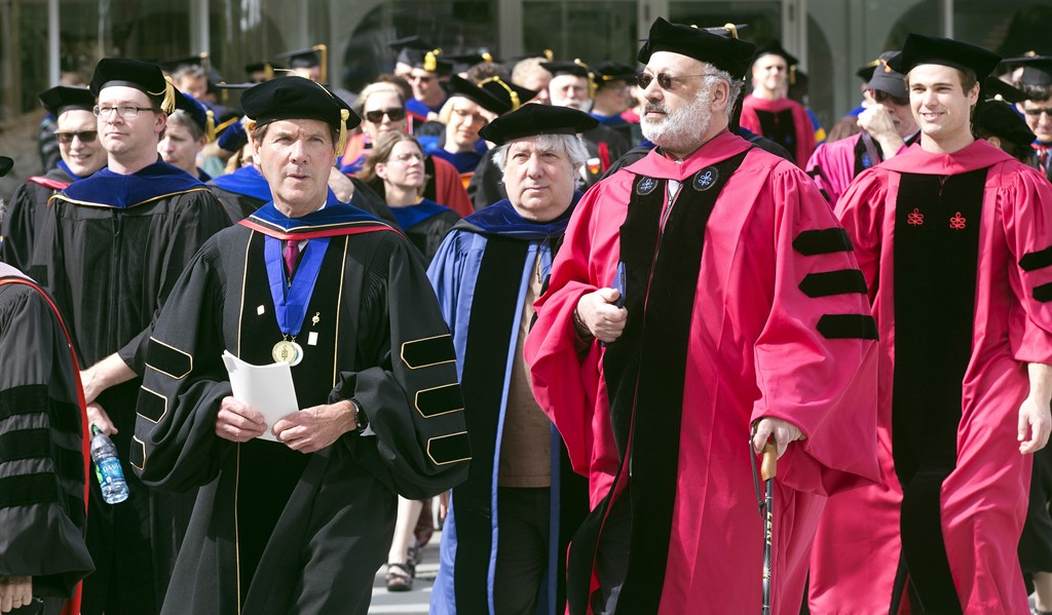College professors and university administrators on American college campuses are expressing outrage that President Donald Trump wants them to sign a compact with certain loyalty provisions, among other things.
The American Association of University Professors (AAUP) even has a dedicated MoveOn.org page objecting in true theater-kids style over the notion that the American head of state would want college professors and their schools to acknowledge a certain loyalty to the country where they are located.
“The Trump administration is trying to blackmail schools to let him and his unqualified bureaucrats run our schools. They want to dictate what schools teach, who they admit and hire, what researchers study, and who's able to be safe at school,” the page says.
“We need to be united and loud in our opposition to this assault on education, and demand that our universities commit to upholding freedom of speech and to providing an affordable, safe education for all.”
The Massachusetts Institute of Technology (MIT) last week was the first university to decline the president’s invitation to sign on with his “Compact for Academic Excellence in Higher Education.” In addition to MIT, the Trump Administration invited eight other schools — all of which receive federal monies — to “sign the pledge” of loyalty to America, among other things.
In other words, MIT wants to keep getting your American taxpayer money, but the school does not want to return the favor by simply declaring loyalty to the nation and its citizens that provide the funding.
The other colleges invited to sign on include: the University of Arizona, Brown University, Dartmouth College, the University of Pennsylvania, the University of Southern California, the University of Texas, Vanderbilt University, and the University of Virginia.
Trump’s compact requests that participating universities freeze tuition rates for five years, stop any use of sex and gender as criteria for admissions, and cap international student population numbers. In addition, the compact stipulates that colleges have to commit to "transforming or abolishing institutional units that purposefully punish, belittle, and even spark violence against conservative ideas."
In rejecting the White House’s invitation, MIT president Sally Kornbluth posted her response to the university’s website. “The institute’s mission of service to the nation directs us to advance knowledge, educate students, and bring knowledge to bear on the world’s great challenges. We do that in line with a clear set of values, with excellence above all,” Kornbluth wrote. She said the school “prides itself on rewarding merit” and “opens its doors to the most talented students,” and “we value free expression.”
Notice that Kornbluth said that MIT “prides itself on rewarding merit” as justification for rejecting the Compact.
This is the same school that in 2021 published a “Strategic Action Plan for Diversity, Equity, and Inclusion,” where it detailed university-wide objectives, commitments, and a framework for measuring DEI progress. As is now commonly understood, DEI is the antithesis of "rewarding merit."
Even though its 2021 DEI charter wasn’t apples-to-apples when compared to Trump’s compact, it was a documented commitment to DEI. After Trump took office this year, MIT in May said it would no longer require DEI/diversity statements in faculty hiring, which it had been doing. In another development this year, the college said it planned to dissolve its central DEI office.
For its part, the AAUP urged its members’ universities and colleges to reject the compact, which it called a loyalty oath.
“This compact directly undermines our right to academic freedom and goes against every democratic principle our country and our schools should uphold. We reject the Trump administration’s attempt to cajole universities into compliance through explicit bribery. Extorting our universities to comply with ideological demands and quell freedom of speech is not only anti-democratic; it threatens our ability to teach and study freely, and thus the very bedrock of academia in the United States of America,” the organization said on its MoveOn.org web page.
According to the AAUP’s logic, to expect loyalty to America in America is anti-democratic and runs against the “bedrock of academia in the United States of America.”
This is the same AAUP that was just fine with schools forcing candidates for faculty positions to sign DEI statements as a condition of employment. Said the AAUP on its website:
The AAUP has released a new statement titled Diversity, Equity, and Inclusion Criteria for Faculty Evaluation, which holds that, when appropriately designed and implemented, diversity, equity, and inclusion (DEI) criteria for faculty appointment, reappointment, tenure, and promotion are compatible with academic freedom and may serve as an important means of fostering a diverse and inclusive academic environment.
The statement was approved by the AAUP’s Committee A on Academic Freedom and Tenure. The AAUP has long advocated for diversity in higher education, including a diverse faculty and student body, and views the use of DEI criteria in faculty recruitment, promotion, and retention within a broader vision of higher education for the public good.
To recap: If you want to get federal money, it’s anti-American to have to sign an oath or a compact. But it’s okay to have to sign an oath or a statement as a condition of employment, so long as it’s about DEI.










